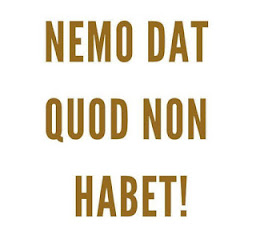In practice, there are about two broad rights that may exist in an object- possessory right and ownership right. While these may be used interchangeably by the ordinary man, it is important to note that, stricto sensu, they are distinguishable. Though they are more often than not vested in the same individual, they may vest in two different individuals. That is to say, one party may have the right to ownership of the subject matter while another party may have the possessory right over the said subject matter. The commonest example of where these rights may be vested in two separate parties is the agency relationship (the right to ownership vests in the principal while the right to possession rests with the agent). The right to possession is subjected to that of ownership, i.e. ownership is a higher right than possession. Some situations may then arise where one with a possessory right intends to pass "ownership rights" to a third party. This is where the Nemo Dat Quod Non Habet Rule (hereinafter referred to as the Nemo Dat Rule) comes in.
This Common Law rule, as provided for by section 21(1) of the Sales of Goods Law, 1893, states that no one can give a title better than that which he has. The section states that:
subject to the provisions of this law, where goods are sold by a person who is not the owner thereof and who does not sell them under the authority or with the consent of the owner, the buyer acquires no better title to the goods than the seller has unless the owner of the goods is by his conduct precluded from denying the seller's authority to sell.To further explain this concept, recourse may be had to the English case of GREENWOOD v. BENNETT [1972] 3 All ER 586. In this case, Bennett, the original owner of a Jaguar car, entrusted it to a man named Searle for repairs to be carried out. Searle then used the car for his own personal purposes, crashed it and caused extensive damage to the car. He then sold the car for £75 to a garage owner named Harper. Harper, not realizing that Searle was not the owner, spent £226 repairing the car and then sold it to a finance company. The court held that the car belonged to Bennett as Searle did not have a title and could therefore not transfer title to Harper. Consequentially, Harper did not have the right to transfer title to the finance company. Bennett was therefore able to recover the car but had to compensate Harper for the work done to it.
As it is with every principle in law, the Nemo Dat Rule has several exceptions which limit the scope of the rule. We shall now briefly examine some of these exceptions where the rule will not apply.
- Sale under the authority of the owner: this exception has been implied by the words of section 21(1) of the Sales of Goods Act, 1893 as stated above. The courts will always hold that a buyer has good title if the seller can prove that he carried out the transaction with the authority of the owner. Here, it will be taken that the seller acted as an agent of the owner (the principal).
- Misleading conduct on the part of the owner: this is another exception provided for by section 21(1). The owner cannot challenge the sale if, by his conduct, he has represented the seller as having the authority to sell. This is a form of estoppel by conduct.
- Sale by a mercantile agent: a mercantile agent can be described as an agent who has authority, in the normal course of his business as such agent, to either sell goods, consign goods for the purpose of sale, buy goods or raise money on the security of goods. A mercantile agent who is in possession of goods or document of title to the goods with the consent of the owner can pass a good title if the sale or disposition is in his normal cause of business. This is provided the buyer buys in good faith. See the case of EASTERN DISTRIBUTORS LTD. v. GOLDRING (1957) 2 Q.B. 600.
- Sale under any special common law or statutory power of sale: this exception relates to any contract of sale carried out pursuant to any order of a court of competent jurisdiction (an example is a sale by a judgment creditor or sheriff- MBANUGO v. UAC (1961) All NLR 775, special common law rule or statutory power of sale.
- Sale in a market overt: section 22(1) Sales of Goods Act provides, "where goods are sold in market overt, according to the usage of the market, the buyer acquires a good title to the goods, provided he buys them in good faith and without notice of any defect or want of title on the part of the seller." In the case of LEE v. BAYES (1856) 2QB 314, the phrase "overt market" was defined as a public and legally constituted market. Thus, the Nemo Dat Rule will not apply where the sale was carried out in a public and legally constituted market provided that the buyer bought in good faith and without knowledge of any possible defect or lack of title in the seller.
- Sale under a voidable title: a voidable title is a title a party may choose to annul or void due to fraud or some other irregularity. The title however remains valid until and unless the said party chooses to exercise his right to void it. By section 23 of the Act, where the seller of goods has a voidable party thereto, but his title has not been avoided at the time of the sale, the buyer acquires a good title to the goods, provided he buys them in good faith and without notice of the defect in the seller's title.


Comments
Post a Comment